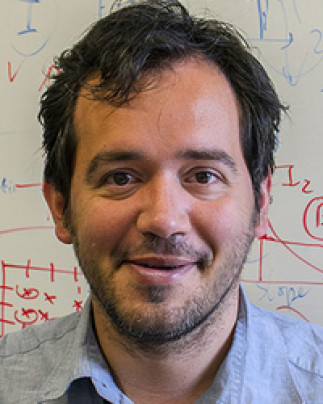Titre : Manufacturing of Lithium Ion Batteries with the Support of Multiscale Modeling and Artificial Intelligence
Endroit: A-3561 , Campus MIL
Hôte : Prof. Mickaël Dollé
Alejandro A. Franco,1,2,3,4,*
1 Laboratoire de Réactivité et Chimie des Solides (LRCS), CNRS UMR 7314, Université de Picardie Jules Verne, HUB de l’Energie, Rue Baudelocque, 80039 Amiens, France
2 Réseau sur le Stockage Electrochimique de l'Energie (RS2E), Fédération de Recherche CNRS 3459, HUB de l’Energie, Rue Baudelocque, 80039 Amiens, France
3 ALISTORE-European Research Institute, Fédération de Recherche CNRS 3104, HUB de l’Energie, Rue Baudelocque, 80039 Amiens, France
4 Institut Universitaire de France, 103 Boulevard Saint-Michel, 75005 Paris, France
*alejandro.franco@u-picardie.fr
RésuméIn this lecture I report recent research progress achieved in our ARTISTIC project, which aims at developing a multiscale computational platform simulating the different steps along the manufacturing process of Lithium Ion Batteries (LIB).1 Such a platform aims at predicting the influence of the process parameters on the final LIB performance upon cycling, but also at performing reverse engineering.2 The platform combines physical models (e.g. Coarse Grained Molecular Dynamics, Discrete Element Method, Lattice Boltzmann, continuum) with Artificial Intelligence (A.I.) algorithms devoted to the models parameterization but also to the analysis of the experimental data. Results are presented in regards to the simulation of slurries, coating, drying, calendering and electrolyte impregnation for different NMC-based formulations.3,4 Furthermore, 4D-resolved continuum performance simulations capturing the influence of the spatial location of carbon-binder within the electrodes on the electrochemical response are also discussed.5,6 Additionally, the power of A.I. to unravel manufacturing parameters interdependencies is demonstrated.7 The practical implications of the ARTISTIC platform towards the manufacturing process optimization and the integration of new battery chemistries are discussed.
- ERC Consolidator Project ARTISTIC (Advanced and Reusable Theory for the In Silico-optimization of composite electrode fabrication processes for rechargeable battery Technologies with Innovative Chemistries), grant agreement #772873 (https://www.u-picardie.fr/erc-artistic/).
- Franco, A. A., Rucci, A., Brandell, D., Frayret, C., Gaberscek, M., Jankowski, P., & Johansson, P. (2019). Boosting rechargeable batteries R&D by multiscale modeling: myth or reality?. Chemical reviews, 119(7), 4569.
- Ngandjong, A. C., Rucci, A., Maiza, M., Shukla, G., Vazquez-Arenas, J., & Franco, A. A. (2017). Multiscale simulation platform linking lithium ion battery electrode fabrication process with performance at the cell level. The journal of physical chemistry letters, 8(23), 5966.
- Rucci, A., Ngandjong, A. C., Primo, E. N., Maiza, M., & Franco, A. A. (2019). Tracking variabilities in the simulation of Lithium Ion Battery electrode fabrication and its impact on electrochemical performance. Electrochimica Acta, 312, 168.
- Chouchane, M., Rucci, A., & Franco, A. A. (2019). A Versatile and Efficient Voxelization-Based Meshing Algorithm of Multiple Phases. ACS Omega, 4(6), 11141.
- Chouchane, M., Rucci, A., Lombardo, T., Ngandjong, A. C., & Franco, A. A. (2019). Lithium ion battery electrodes predicted from manufacturing simulations: Assessing the impact of the carbon-binder spatial location on the electrochemical performance. Power Sources, 444, 227285.
- Pinto-Cunha, R., Lombardo, T., Primo, E., & Franco A.A. (2019). Artificial Intelligence Investigation of NMC Cathode Manufacturing Parameters Interdependencies. Batteries & Supercaps. https://doi.org/10.1002/batt.201900135
Short bio: Pr. Alejandro A. Franco (born 1977 in Bahia Blanca, Argentina) received his PhD diploma in 2005 from Université Claude Bernard Lyon 1, France, with his thesis dealing with the multiscale modeling of polymer electrolyte fuel cells. He was permanent research Engineer at CEA-Grenoble in 2006-2012, he is since 2013 Full Professor at Université de Picardie Jules Verne in Amiens, France and since 2016 Junior Member of the Institut Universitaire de France which recognizes the top 2% research professors in France. He is the leader of the Theory Open Platform at the ALISTORE European Research Institute. His current research involves the multiscale modeling and simulation of electrochemical energy devices, such as lithium ion, lithium sulfur, lithium air and redox flow batteries. He is grantee of a prestigious ERC (European Research Council) consolidator grant for his project “ARTISTIC” about the modeling of lithium ion battery manufacturing (2 million Euros for 5 years). His scientific production includes more than 78 publications in peer-reviewed international journals, 10 invited book chapters, 3 invited edited books, 20 patents, more than 60 invited keynotes/invited oral presentations in international conferences and more than 38 invited seminars (e.g. MIT, University of Cambridge, Stanford University, ANL, ORNL, LBNL, Samsung, Bosch, etc.). He has been coordinator/PI/Work package leader in many national and European projects as well as in bilateral projects in collaboration with industry on electrochemical energy devices. He is recipient of the French National Prize for Pedagogy Innovation 2019 (PEPS 2019) for his work on the development and use of Virtual Reality technologies for teaching Energy Conversion and Storage at the University Level. Prof. Franco is also strongly involved in Science Dissemination activities towards general public, with frequent invited presentations in Science Festivals like Pint of Science, participation in radio programs, etc.

